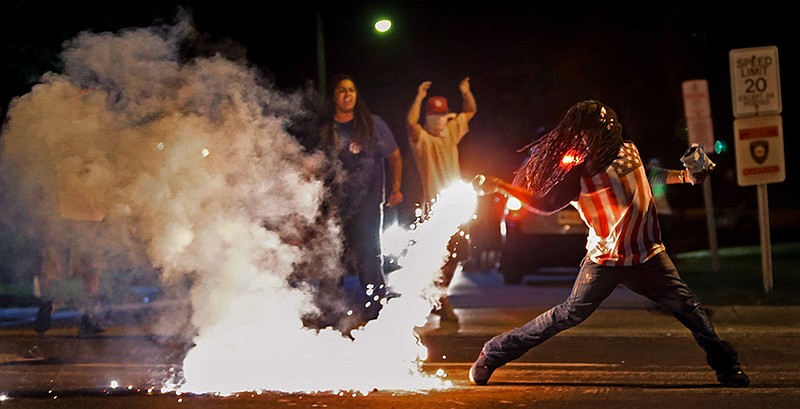Read more
Protests return in Ferguson for second night
Last week it was Baltimore. Before that it was Ferguson. It simmers in Charleston, S.C.; Cleveland, Ohio; Anywhere, America -- even Chattanooga.
There is a state of emergency in our nation's inner cities where the private and desperate frustration of poverty meets police, and the two pummel each other like crazed pit bulls.
As images of Baltimore burning filled the air waves after yet another black man's senseless death at the hands of police, many pundits pulled out Martin Luther King's quote from the aftermath of the Watts riots 50 years ago: "A riot is the language of the unheard."
It has probably never been truer than it is today.
In the Baltimore community where 25-year-old Freddie Gray lived before he died from a severed spinal cord received while he was in police custody, unemployment is 51.8 percent. The high school student absentee rate is almost that high. More than 60 percent of residents lack a high school diploma. The number of vacant or abandoned residential properties tops 33 percent. Violent crime (what of it is reported) touches one in four people. Justice Policy Institute research shows that life expectancy is only 68.
Chattanooga has communities like this. In fact, 27 percent of the city's residents live below the poverty line, compared with 15 percent nationwide. Women head 42 percent of the city's poor households, and about 42 percent of the city's children are poor, nearly double the rate statewide.
"The face of poverty in this community is women, especially women of color," says Valerie L. Radu, a professor of social work at the University of Tennessee at Chattanooga, and the new executive director of the Chattanooga/Hamilton County Family Justice Center.
Those women raise children who become the young people often in conflict with police.
Chattanooga Mayor Andy Berke, when he introduced his Baby University plan last year, noted that about one in four babies born in Hamilton County every year are at risk of not being ready for school. Single parents, low educational attainment by a parent, teen pregnancy are factors. Chattanooga has neighborhoods and ZIP codes where more than 75 percent of births are to single mothers, more than half are born into poverty, and almost 20 percent are not born at a healthy weight.
These poorly prepared young people often fail in school or are suspended and expelled -- doomed then to Gang High School on the streets. Poverty begets poverty and becomes tomorrow's riot of the unheard.
Don't fall for the stereotype that poor people "don't want" to work. When Volkswagen opened a $1 billion assembly plant here in 2011, 80,000 people applied for 2,000 jobs. Most didn't have the math skills for jobs that involve advanced machinery.
There likely will be more Fergusons and Baltimores in coming weeks and months. But let's hope and pray that Chattanooga will not be among them.
It's not that we don't have the history. We do. Too much of it.
But we also have new leaders like Berke and Police Chief Fred Fletcher who are working hard to address Chattanooga's problem poverty areas. The mayor's Baby University is an example. It helps new and young parents understand the importance of talking and reading to infants and toddlers. The mayor also has expanded Head Start programs.
Chief Fletcher has added a layer to Chattanooga's police cadet training program that doesn't just introduce the young officers to our city's diverse cultures but immerses them in those cultures with the intent of helping them understand that people of all colors, all religions, all economies and all persuasions are in many ways just like them: They love, they hope, they laugh, they cry and they dream.
In the year Fletcher has been in Chattanooga, he has breathed both new tolerance and new toughness into the city's approach to community policing. Gang shootings have dropped 19 percent (24 percent just from October to March). And the city is now taking on a domestic violence and sexual assault program because those issues are driving 30 percent of our violent crime -- much of it in those very poor, very frustrated communities where the unheard can erupt any time.
But it can't just be up to the mayor and police. If raising a child takes a village, then building a strong community takes all of us. Schools, churches, businesses, organizations, volunteers, neighbors.
All of us.
""A riot is the language of the unheard."
-- Dr. Martin Luther King"
-- Dr. Martin Luther King
